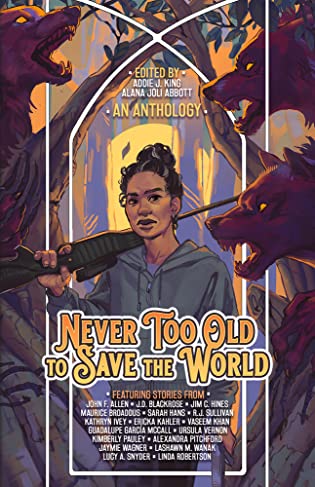 Never Too Old to Save the World: A Midlife Calling Anthology by Alana Joli Abbott, Addie J. King
Never Too Old to Save the World: A Midlife Calling Anthology by Alana Joli Abbott, Addie J. King Format: eARC
Source: supplied by publisher via NetGalley
Formats available: paperback, ebook
Genres: fantasy, science fiction, short stories, urban fantasy
Pages: 318
Published by Outland Entertainment on February 7, 2023
Purchasing Info: Author's Website, Publisher's Website, Amazon, Barnes & Noble, Kobo, Bookshop.org, Better World Books
Goodreads
Once every generation there is a Chosen One, who will stand between humanity and darkness.
But why is the Chosen One so often a teenager? Why do only children get swept through portals to save the fantastic world on the other side? Whose idea was it to put the fate of the world in the hands of someone without a fully developed prefrontal cortex?
In Never Too Old to Save the World, nineteen authors explore what would happen if the Chosen One were called midlife. What would happen if the Chosen One were:
a soccer moma cat ladya nosy grandmothera social workera retireean aging swordmaster?
The Chosen One could be anyone— because when the universe calls, the real question is whether the hero will take up the mantle and answer their midlife calling. Sometimes the world needs a hero who's already been in the thick of chaos and survived. In those cases, age does matter.
My Review:
What if you didn’t find a wardrobe to Narnia – or anywhere else – back when you were 8? And you didn’t get your Hogwarts letter at 11? And Gandalf didn’t even manage to come to take you on an adventure at 50?
Or perhaps, by the time Gandalf found you at 50, you thought you were too old to go on adventures – or – and much more likely – had too many commitments in the so-called ‘real world’ to run off and leave your responsibilities behind? After all, Bilbo very nearly did.
That’s what this collection is about. It’s all about people who pick up the mantle of the ‘Chosen One’ in some fantasy or science fictional world who are explicitly not children or teens. Who are a bit too tied down – or a bit too wised up – to be the fool that rushes in where angels rightly fear to tread. Or so they think.
This collection is for everyone who missed that wardrobe or that letter and still wonders whether or not they’d have what it takes – or have the willingness to feel the fear and do it anyway – if a white wizard or a mad man with a blue box came calling for them.
There are 19 fabulous stories in this collection – and I think I loved every single one. To the point where I can’t just pick one favorite. I have to pick two.
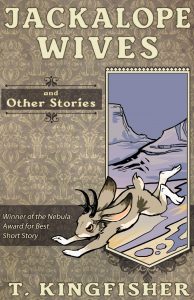 My favorite fantasy story is “Jackalope Wives” by Ursula Vernon – who also writes marvelously fantastic fantasy and horror as T. Kingfisher. “Jackalope Wives” is the only story in the book that has been previously published, originally in Apex Magazine and later in her short story collection Jackalope Wives and Other Stories.
My favorite fantasy story is “Jackalope Wives” by Ursula Vernon – who also writes marvelously fantastic fantasy and horror as T. Kingfisher. “Jackalope Wives” is the only story in the book that has been previously published, originally in Apex Magazine and later in her short story collection Jackalope Wives and Other Stories.
This is the story that won the 2014 Nebula Award for Best Short Story and should have won the 2015 Hugo Award in the same category. But, well, puppies. I digress and I need to stop to keep from going there again. Because ARRGGGHHH. Still.
“Jackalope Wives” is one of those stories that surprises the reader with a twist at the end that is even more heartbreaking, in its way, than the story you thought you were reading – which was already heartbreaking enough. Grandma Harken is absolutely correct that “You get over what you can’t have faster than you get over what you could.” But the truth of that statement doesn’t make the getting over any faster or any easier.
As a counterweight to the bitter, bitter sweetness of “Jackalope Wives”, my science fictional favorite story is “Launch Day Milkshakes” by Jim C. Hines, which is literally laugh out loud funny. To the point where I started laughing and couldn’t get a breath OR stop as my spouse looked over at me like I’d lost my mind because I could not catch enough breath to explain the joke.
At first, “Launch Day Milkshakes” is a story about absolutely deliciously getting one over on a misogynistic asshat boss in the biggest and best way possible. It’s also a brainship story in the vein of Anne McCaffrey’s classic, The Ship Who Sang. But that’s not all it is, and neither of those things were the parts that made me laugh so hard – no matter how much I enjoyed the asshat’s comeuppance. Which I very much did. I’m not going to spoil this one because it’s just so much fun when you get the joke – and see it get batted around like the universe’s biggest ball of yarn.
I know I said two favorites, but my third is kind of a riff on Buffy, meaning that there’s some urban fantasy in here as well. “Lean In: The Lord of Hell is Coming” by Ericka Kahler starts out with the local representative for the equivalent of the Watchers coming to a CEO to tell her that demons are coming to her city and that she’s the ‘Chosen One’ who is supposed to vanquish them. It’s not news to Mary Ann because she already has, just not in the way that heaven expected or that hell can ever manage to fight. I think this one is funnier the longer you think about it.
Of the rest of the collection, there are considerably more fantasy stories than SF as fantasy does tend to lend itself more to ‘chosen one’ narratives. Not that there haven’t been more than a few famous SF stories in this vein (I’m looking at you, Luke Skywalker – ahem). But magical appointments, by their very nature, do find themselves a bit more comfy – while their protagonists are generally quite uncomfy – in fantasy.
Because I loved this collection so hard, I can’t resist a brief shout out to every single one of the stories in it. The SF stories are listed first because there were fewer of them and because I’m contrary that way.
- “The M.A.M.I. Incident” by Guadalupe Garcia McCall reminded me a whole lot of Day Zero by Robert C. Cargill which makes for a great but uncomfortable story.
- “Utopia” by Vaseem Khan about making a friend out of a very great enemy.
- “All the World’s Treasures” by Kimberly Pauley about a family legacy that is just so much bigger on the inside than it first appears.
- “Big Momma Saves the World” by Maurice Broaddus about the great power in bad macaroni and cheese.
- “A Legacy of Ghosts” by Sarah Hans about exorcizing one’s very own demon family with the power of positive thinking.
- “Adya and the Messengers” by Jaymie Wagner about the proper treatment of heavenly messengers and their steeds.
- “Soccer Mom Saves the World” by Addie J. King, a story whose title does pretty much say it all.
- “My Roots Run Deep” by John F. Allen about a social worker saving the multiverse and getting her groove back at the same time.
- “It’s My Nature – A ‘Monster Hunter Mom’ Adventure” by JD Blackrose, another one whose title gives more than a bit of a clue about the story.
- “Truthteller” by Linda Robertson, a historical fantasy about an object of power that isn’t quite what any of the parties seeking it imagined.
- “Granny” by R.J. Sullivan about a neighborhood snoop who is way more than she seems.
- “The Sunspear” by Alexandra Pitchford, about a young woman who believes she has a destiny and a middle aged woman who is running from hers.
- “Once a Queen” by Alana Joli Abbott, a Narnia-like story with a much better ending.
- “By the Works of Her Hands” by LaShawn M. Wanak, another Narnia-type story where the portal opens as a lure to pull the right person in chasing after the young fool who rushes in believing that they are ‘the one’ when they’re just bait for their mother.
- “Strange Wings” by Kathryn Ivey about a warning that comes nearly too late.
- And last in both the collection and this list: “The Mountain Witch” by Lucy A. Snyder about the uses to which both heroes and villains are put when they are both female.
Escape Rating A+: I don’t normally list every single story in a collection like this, but this collection frequently got me in the feels and gave me something to identify with in just about every story. Sometimes we all need that reminder that age is just a number and that everyone has it in them to save, if not the world, at least their corner of it.
I’m also still hoping against hope that Gandalf will finally get the hint!

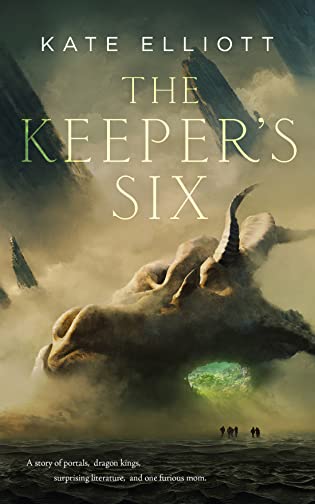 The Keeper's Six by
The Keeper's Six by 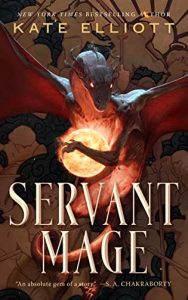 Escape Rating A-: Like the author’s previous novella,
Escape Rating A-: Like the author’s previous novella, 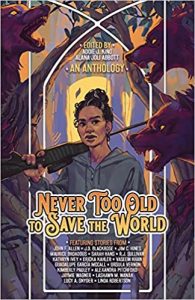 On top of everything else that made The Keeper’s Six so much fun was the way that it seemed to link to so many other wonderful books. Not just the previously mentioned
On top of everything else that made The Keeper’s Six so much fun was the way that it seemed to link to so many other wonderful books. Not just the previously mentioned 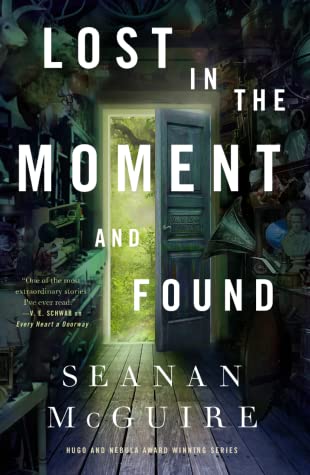 Lost in the Moment and Found (Wayward Children, #8) by
Lost in the Moment and Found (Wayward Children, #8) by 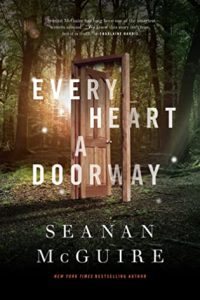 Escape Rating A-: Considering that the author spoils this in an Author’s Note at the very front of the book, I don’t feel at all bad about doing it here as well. Because honestly, if she hadn’t told me up front that Antsy was going to rescue herself from the grooming, gaslighting monster in her own house I wouldn’t have made it through the first chapter.
Escape Rating A-: Considering that the author spoils this in an Author’s Note at the very front of the book, I don’t feel at all bad about doing it here as well. Because honestly, if she hadn’t told me up front that Antsy was going to rescue herself from the grooming, gaslighting monster in her own house I wouldn’t have made it through the first chapter.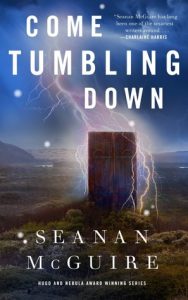 Which won’t stop me from reading the next book in the
Which won’t stop me from reading the next book in the 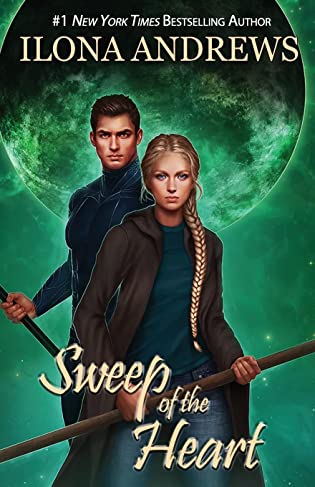 Sweep of the Heart (Innkeeper Chronicles, #6) by
Sweep of the Heart (Innkeeper Chronicles, #6) by 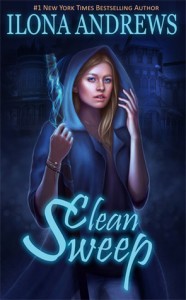 Dina Demille is not exactly a typical innkeeper, and Gertrude Hunt is far from an ordinary inn of any stripe whatsoever. And that’s not just because Dina’s lover, partner and fellow innkeeper, Sean Evans, is an alpha strain werewolf.
Dina Demille is not exactly a typical innkeeper, and Gertrude Hunt is far from an ordinary inn of any stripe whatsoever. And that’s not just because Dina’s lover, partner and fellow innkeeper, Sean Evans, is an alpha strain werewolf. Escape Rating A:
Escape Rating A: 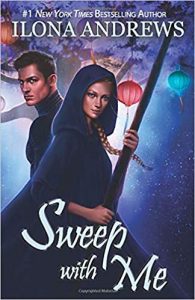 I think that a lot of readers will enjoy the intergalactic Bachelor game even if they are new to the series, but that overarching plot forms the beginning AND the end and may keep those readers from getting to what they would consider the juicy middle. On the other hand, series readers are going to eat the whole thing up with a spoon. Or at least this reader did.
I think that a lot of readers will enjoy the intergalactic Bachelor game even if they are new to the series, but that overarching plot forms the beginning AND the end and may keep those readers from getting to what they would consider the juicy middle. On the other hand, series readers are going to eat the whole thing up with a spoon. Or at least this reader did.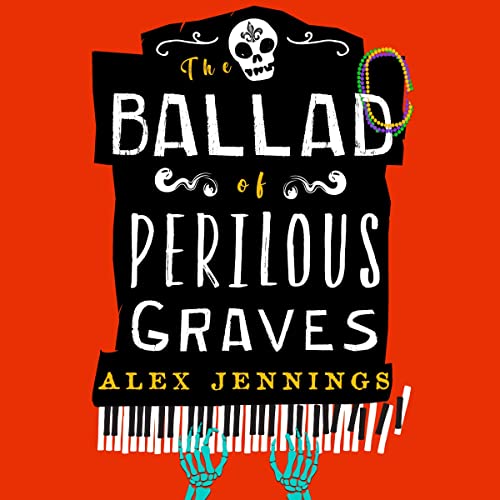 The Ballad of Perilous Graves by
The Ballad of Perilous Graves by 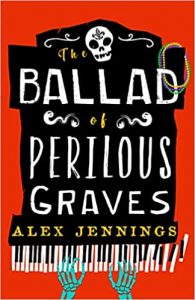 Escape Rating A-: I am a sucker for stories about New Orleans so I was all set to love The Ballad of Perilous Graves. Which in the end I did, although it took awhile to get me there. This is one of those books where the audiobook, as read by Gralen Bryant Banks, carried me over to the point where the story got its hooks into me and didn’t let go.
Escape Rating A-: I am a sucker for stories about New Orleans so I was all set to love The Ballad of Perilous Graves. Which in the end I did, although it took awhile to get me there. This is one of those books where the audiobook, as read by Gralen Bryant Banks, carried me over to the point where the story got its hooks into me and didn’t let go.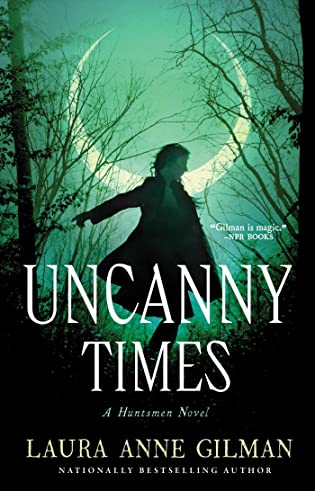 Uncanny Times (Huntsmen #1) by
Uncanny Times (Huntsmen #1) by 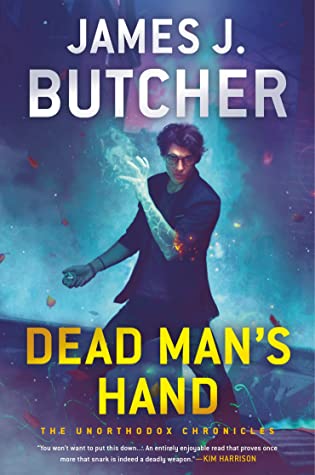 Dead Man's Hand (The Unorthodox Chronicles, #1) by
Dead Man's Hand (The Unorthodox Chronicles, #1) by 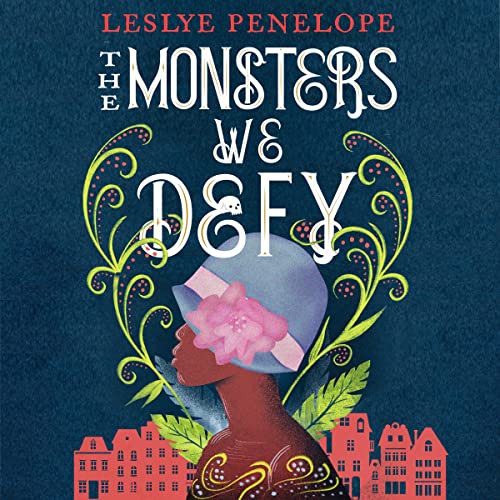 The Monsters We Defy by
The Monsters We Defy by 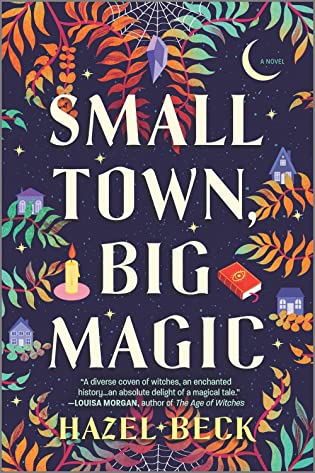 Small Town, Big Magic by
Small Town, Big Magic by 
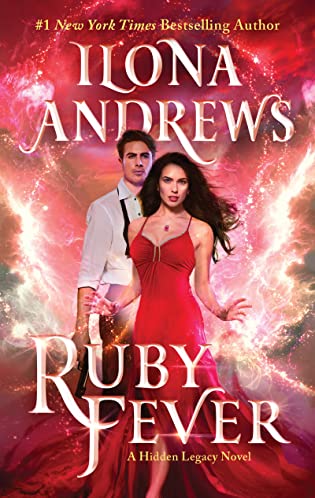 Ruby Fever (Hidden Legacy, #6) by
Ruby Fever (Hidden Legacy, #6) by 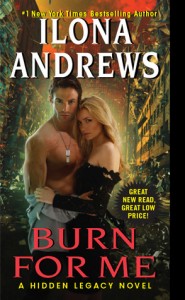 Ruby Fever is the sixth book in the awesome, urban fantasy/paranormal romantic suspense
Ruby Fever is the sixth book in the awesome, urban fantasy/paranormal romantic suspense 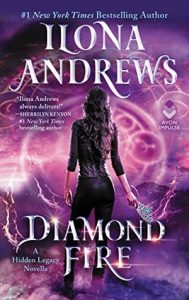 Escape Rating B: The premise of the
Escape Rating B: The premise of the